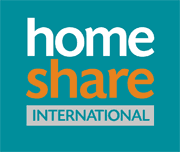We are suffering from an epidemic of loneliness and it’s not just a private sorrow, it’s a public health risk.
In October 2018 the British Government announced a strategy for tackling loneliness after the appointment (back in January 2018) of a Minister for Loneliness (currently Baroness Barran). Loneliness shot up the public agenda after a high-profile government commission and growing research evidence that loneliness is costing the nation billions of pounds annually because of its impact on health. It seems that loneliness is as bad for our health as smoking 15 cigarettes a day and is even more dangerous for our life chances than obesity. It has a particularly high impact on the risks of heart disease, depression and dementia.
| Homeshare is a simple but brilliant idea – it is the exchange of services : housing for help in the home. Homesharing enables two unrelated people to share a home and their lives for their mutual benefit. Companionship and mutual support are at the heart of homesharing – not financial gain. A homesharer provides support and companionship to a householder in exchange for free or low-cost accommodation. |
It’s time for us all to start shouting about what homesharing is saving the public purse in costs to the health service – a fact to mention when applying for funding.
real people help people
People who run homeshare programmes have always seen companionship as one of the main benefits of homesharing. Everyone involved has seen how householders flourish when they are paired with a suitable homesharer and some have documented the impact on their health. We recall a case study from Australia of an elderly man living alone who was so concerned about his health that, in the space of one year, he visited the emergency department of his local hospital no fewer than 51 times. Then he was paired up with a young homesharer – and his medical crises simply vanished. No doubt you know of similar stories.
The UK Government’s new strategy lists many interesting approaches that will be rolled out in the coming years. The main one is ‘social prescribing’ – allowing doctors to offer a service that links lonely people to community activities, whether that’s a coffee club, a walking group, an art class or a ‘Men’s Shed’ project – whatever interests the person concerned.
However, it’s sad to see that the strategy does not even mention homesharing as one of the solutions to the loneliness epidemic. It could be argued that homesharing is the ultimate anti-loneliness project, helping two groups of people to make meaningful connections.
The Loneliness Project is a large-scale, in-depth exploration of how older people experience loneliness and what it means for them. TheConversation.com (September 8, 2021) reported on it in a show called “Loneliness, loss & regret: what getting old really feels like – new study” (It also quotes HI ![]() President Malcolm Johnson.)
President Malcolm Johnson.)
Older topics at TheConversation.com include “How loneliness in older people makes them more vulnerable to financial scammers” and “Loneliness has serious health risks and the solution is social“.
We are pleased to see that in Australia, Fiona Patten, a Victoria MP, is arguing that Australia too needs to act to end the personal sadness and public cost of loneliness. One tenth’s of the country’s population experiences social isolation. ‘Loneliness minister’ proposed to tackle Australian social isolation: https://www.theguardian.com/society/2018/oct/19/loneliness-minister-proposed-to-tackle-australian-social-isolation
In France, postal workers are at the frontline, spending time with isolated older people under an initiative called Veiller sur mes parents (‘Watch over my parents’). This is a paid-for service that recognises that the postman/woman is someone we probably know already and trust completely.
Research Documents:
In Canada, the National Institute on Ageing has published:
- Understanding Social Isolation and Loneliness Among Older Canadians and How to Address It (2022)
- Ageing in the Place: Supporting Older Canadians to Live Where They Want (2022) which includes a reference to homesharing
A connected society: a strategy for tackling loneliness – laying the foundations for change, HM Government, 2018
Background reading and links to other sources: see Campaign to End Loneliness, https://www.campaigntoendloneliness.org/
Loneliness more likely to affect young people: www.bbc.co.uk/news/education-43711606
The Cigna health insurance company’s Research Center states that “Loneliness is at Epidemic Levels in America”:
Fueling the mental health crisis is the loneliness epidemic.
Some of the causes are:
- A lack of social support and infrequent meaningful social interactions
- Negative feelings about one’s personal relationships
- Poor physical and mental health
- A lack of “balance” in one’s daily activities – doing too much or too little of any given thing (e.g., sleep, work)
Signs of Chronic Loneliness
Chances are, everyone has felt lonely at some point in their lives. However, you might not know if you or a loved-one is suffering from chronic loneliness, as the symptoms and signs can differ for each person.
If you consistently feel some or all of the following, you may be dealing with chronic loneliness:
- Inability to connect with others on a deeper, more intimate level
- Many acquaintances but no “best” or “close” friend
- Feelings that no one “gets” you
- Overwhelming feelings of isolation even if you’re at a party surrounded by dozens of people
- Negative feelings of self-doubt and self-worth
- Feeling exhausted when trying to engage in social activities
… Read more at https://newsroom.cigna.com/loneliness-in-america
What to do…
https://connect2affect.org/about-isolation/ – sponsored by the AARP, this USA programme aims to reduce isolation among older people. It lists homesharing as a potential solution
If you are aware of other resources, please email us.
